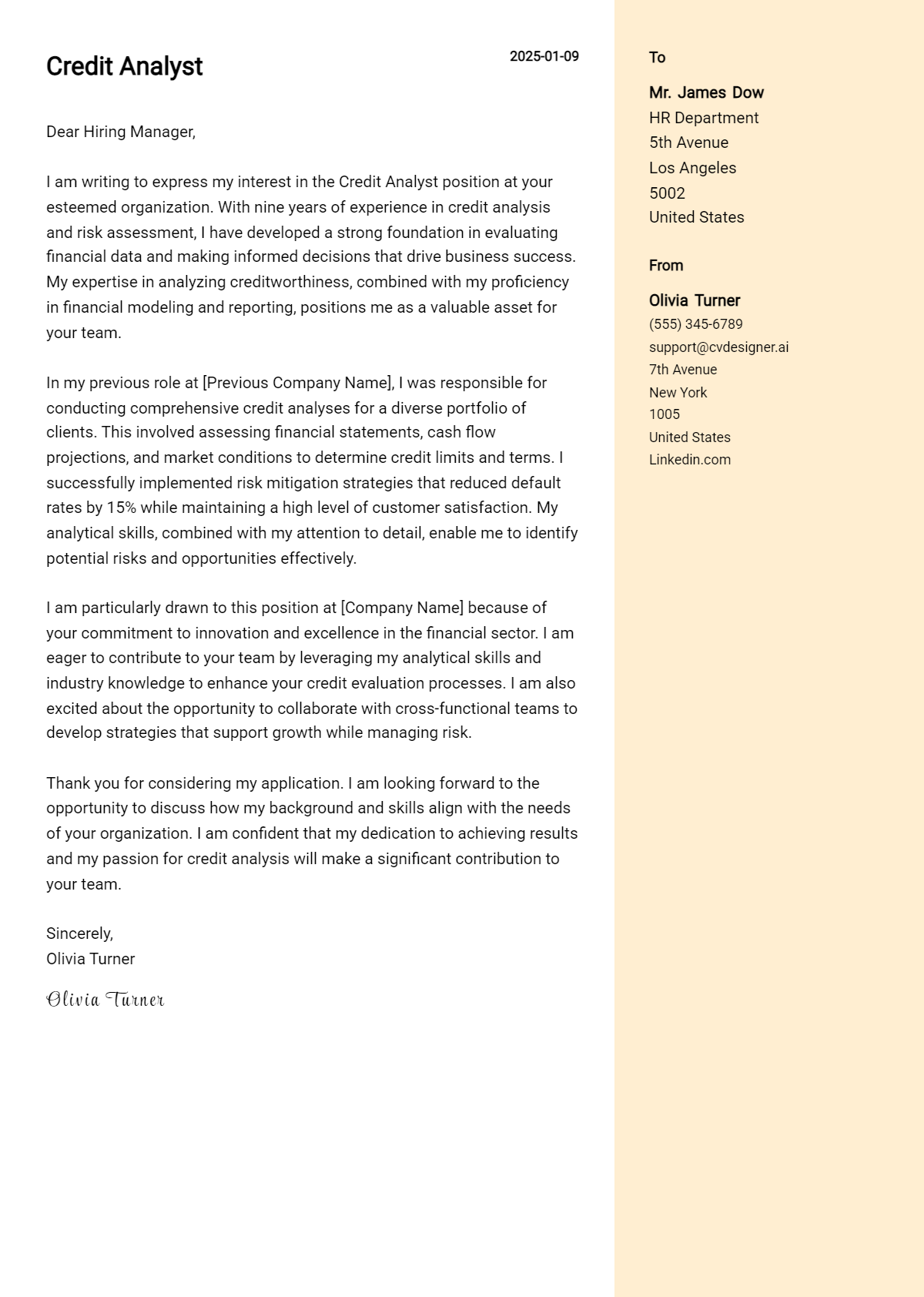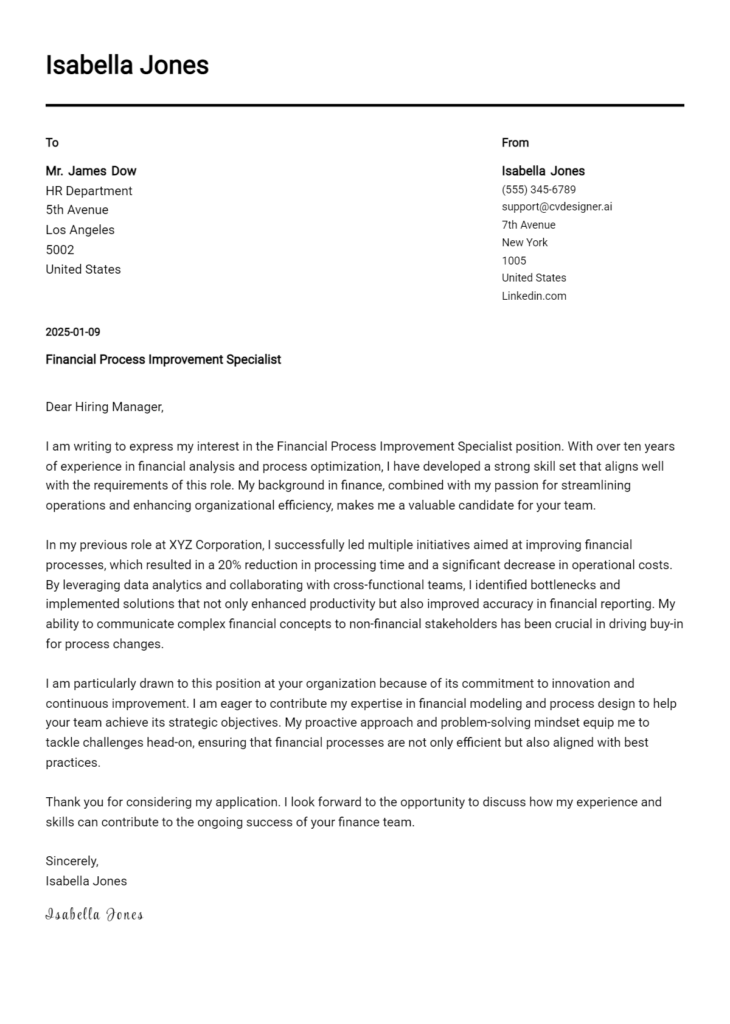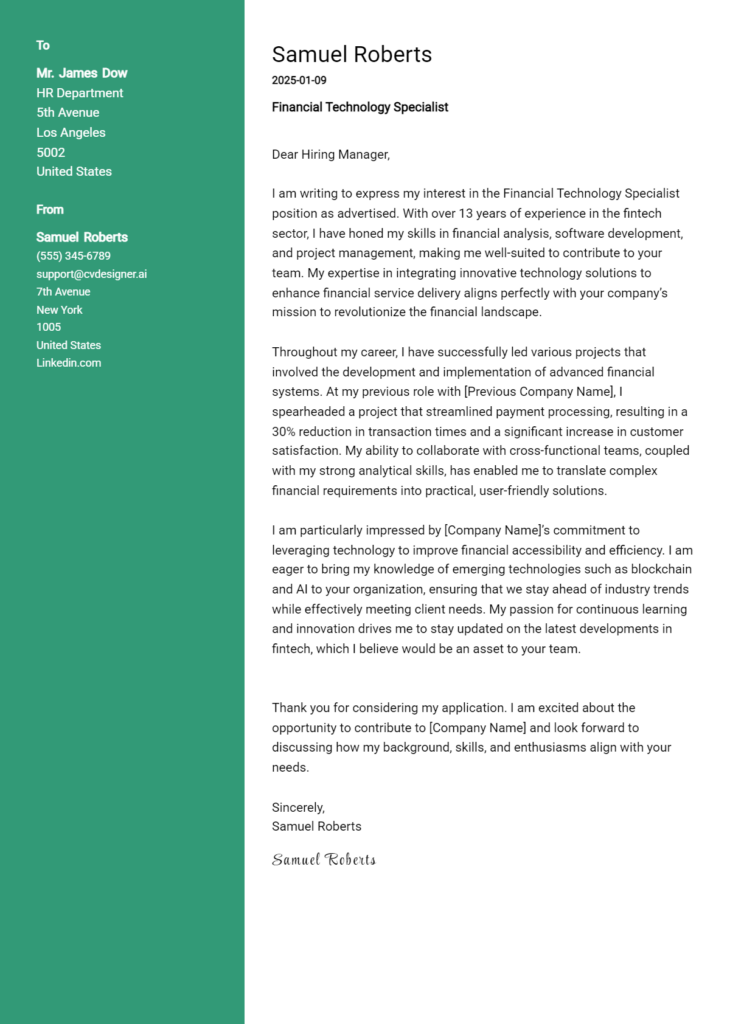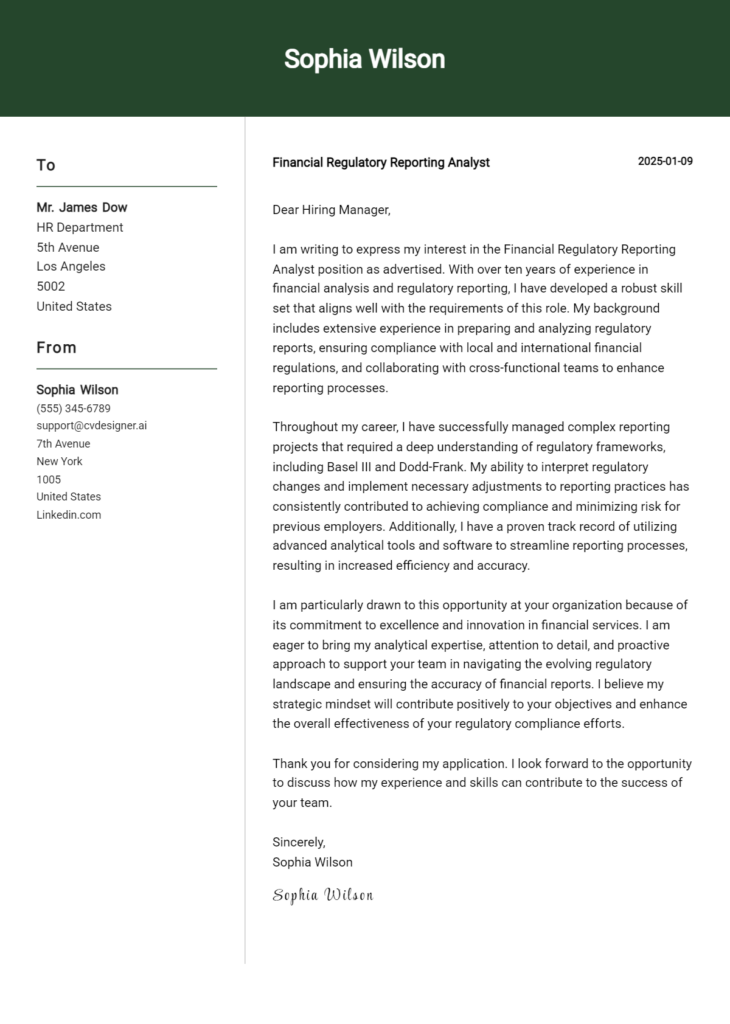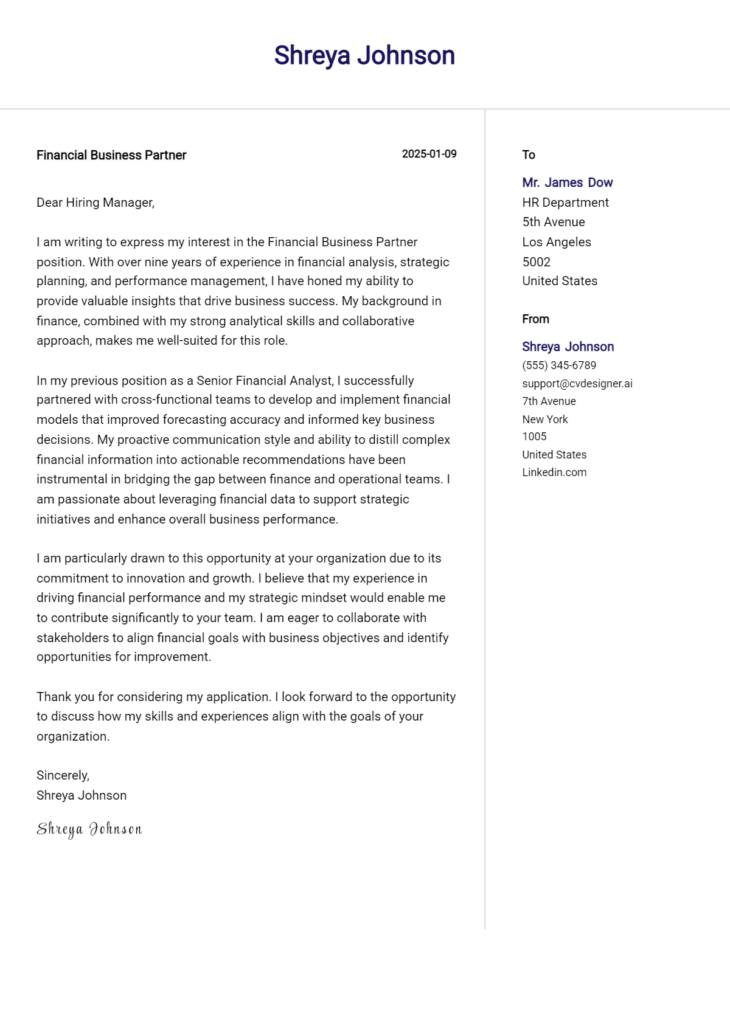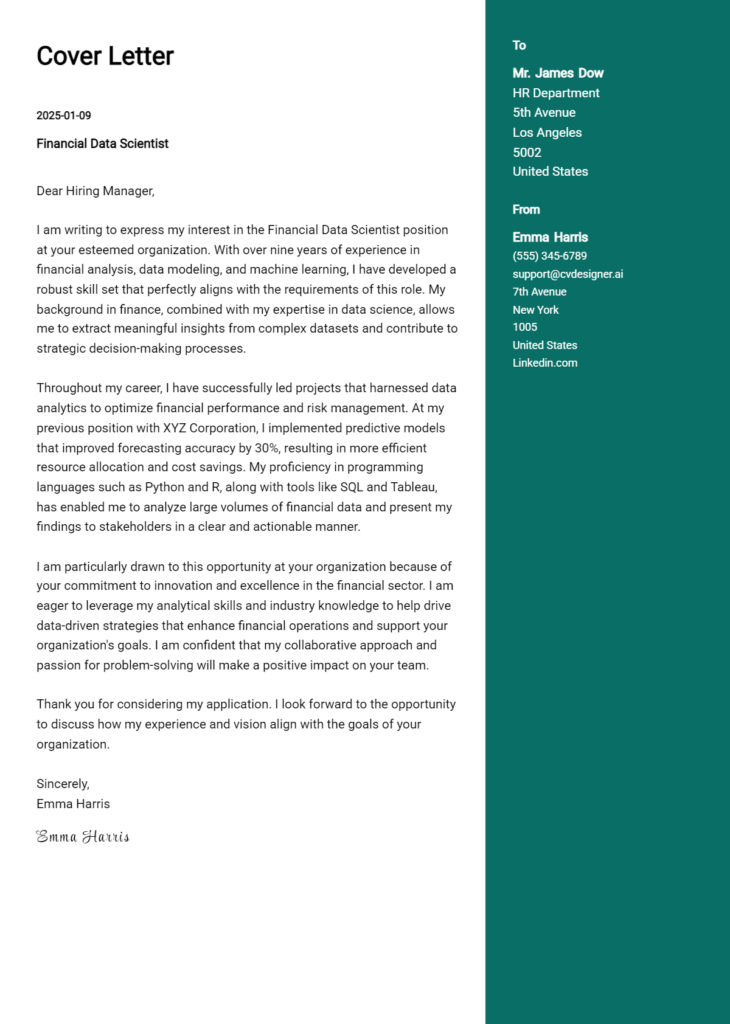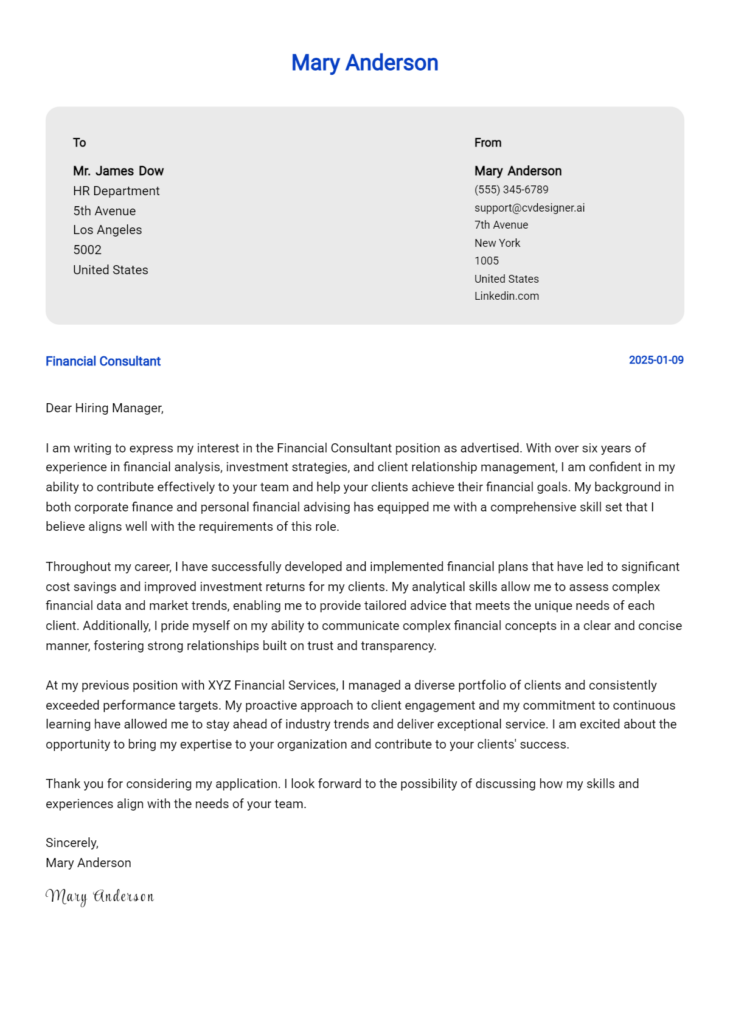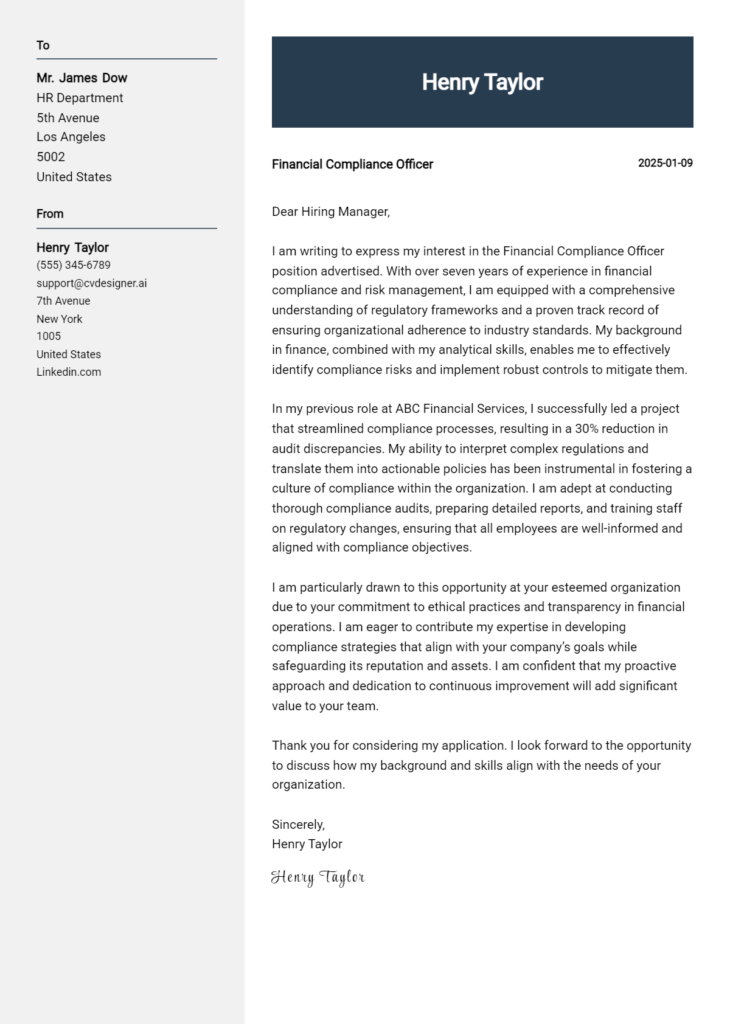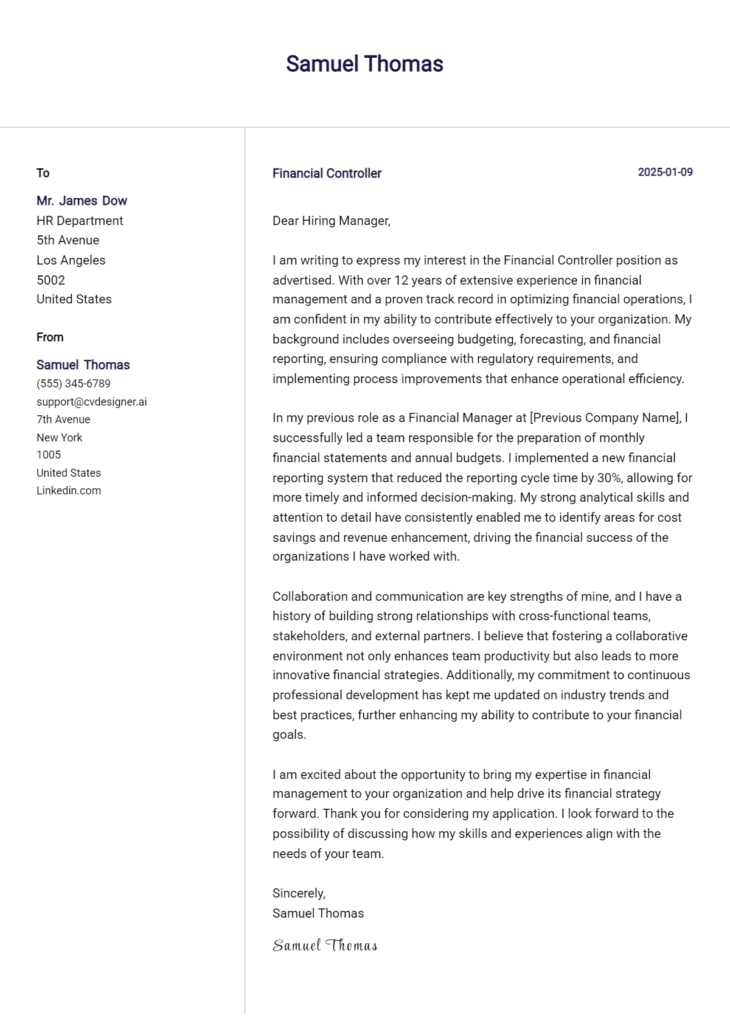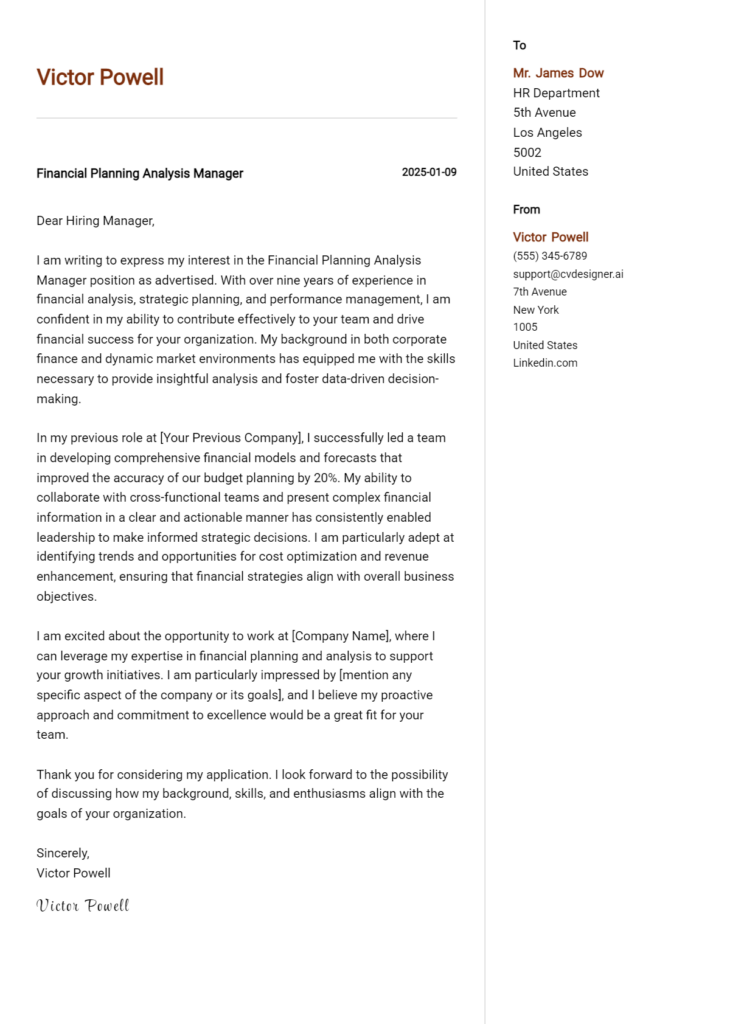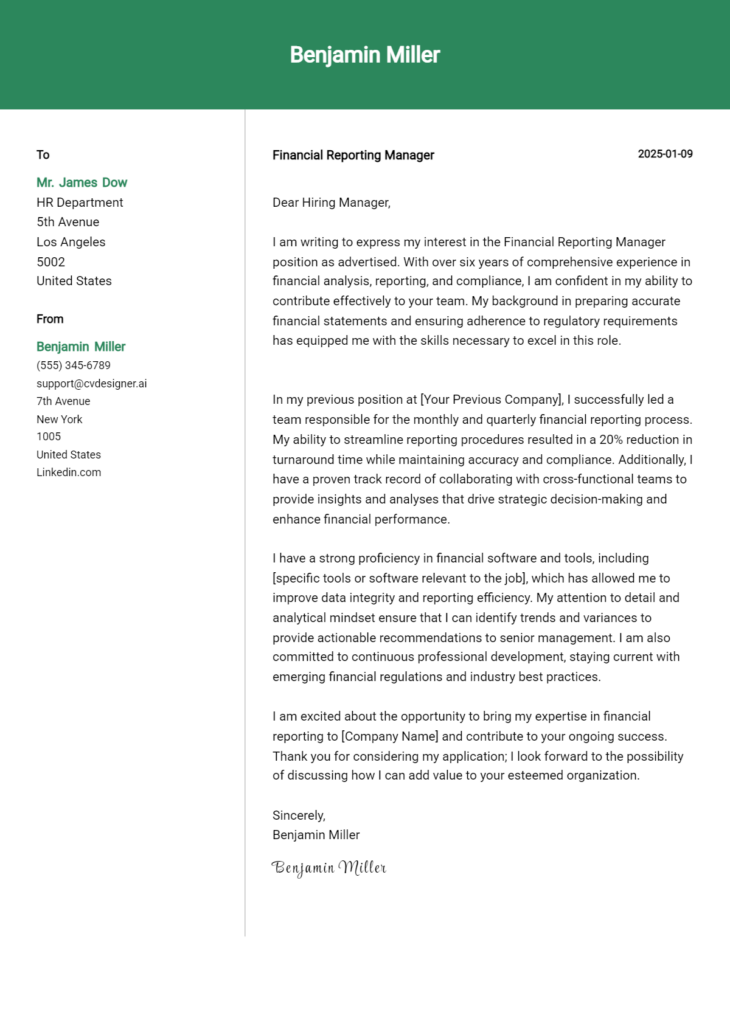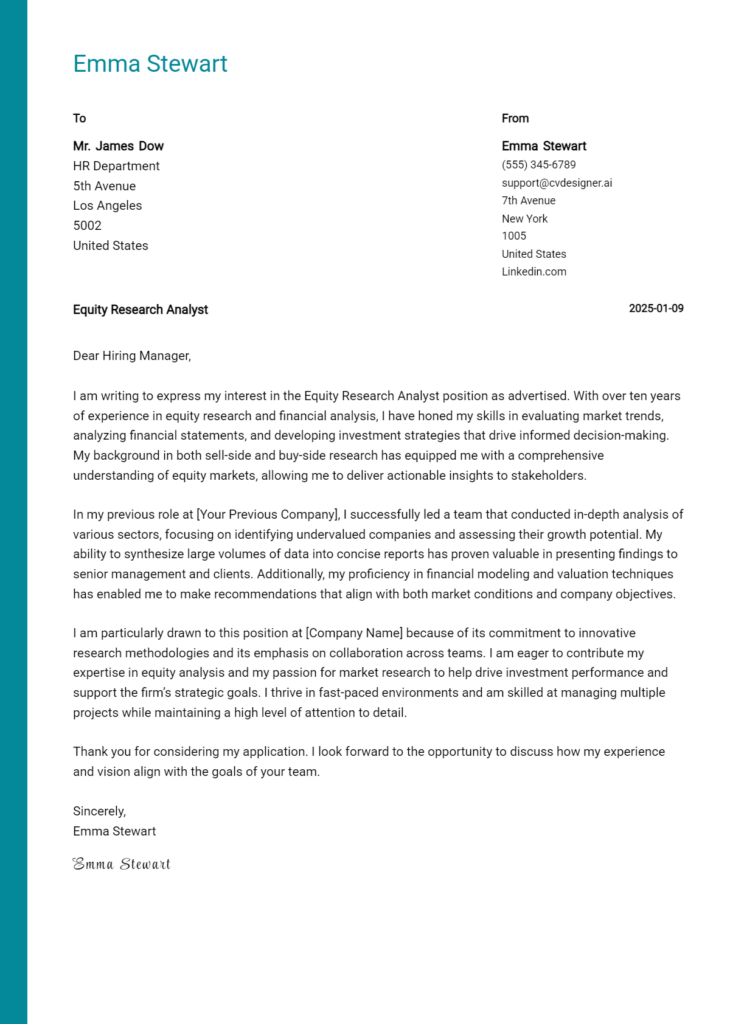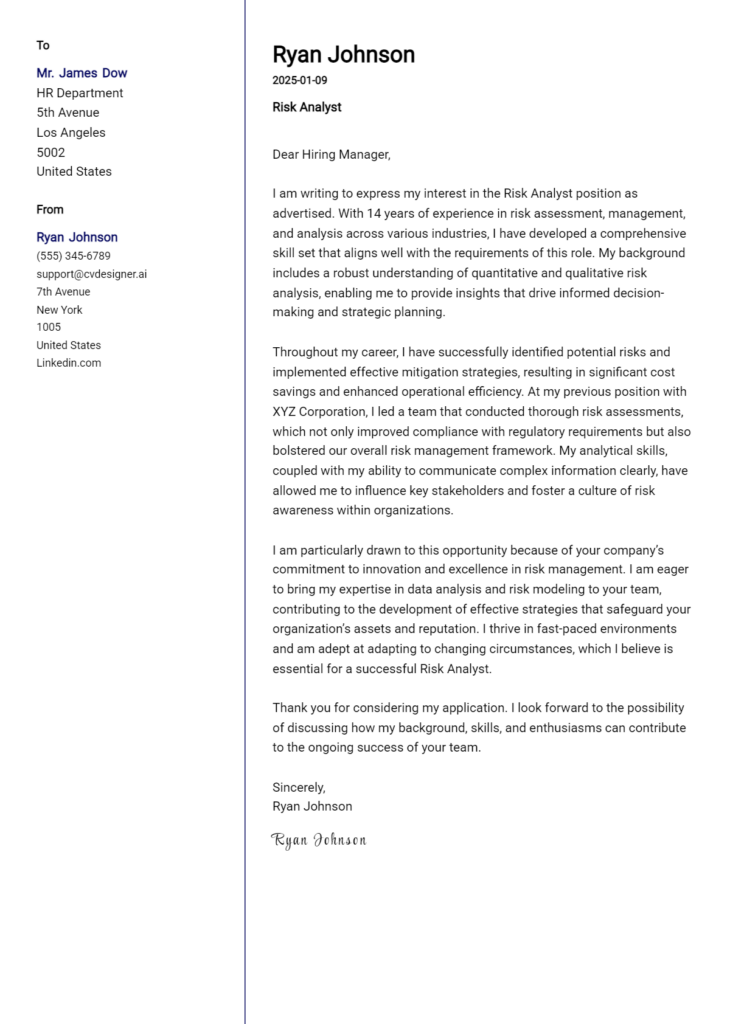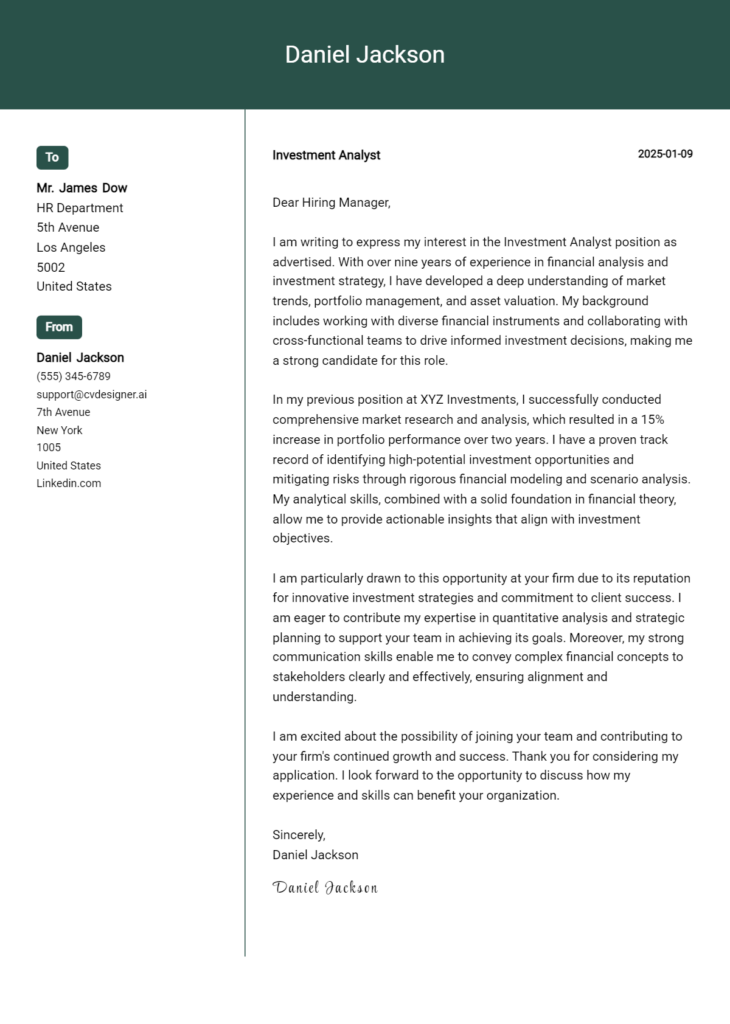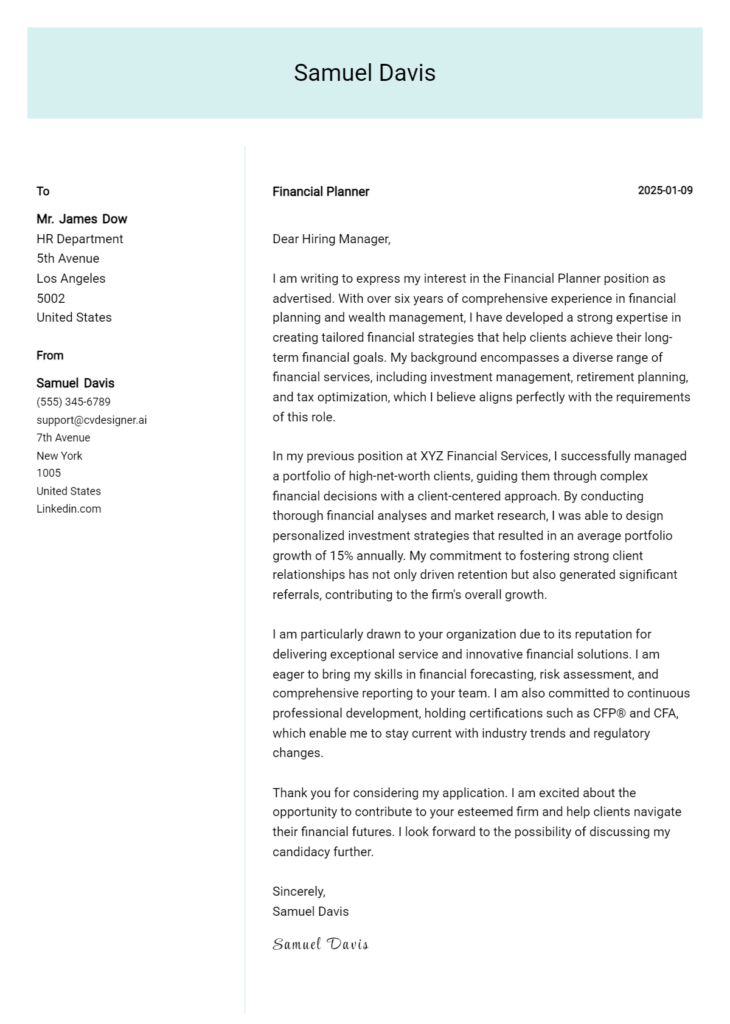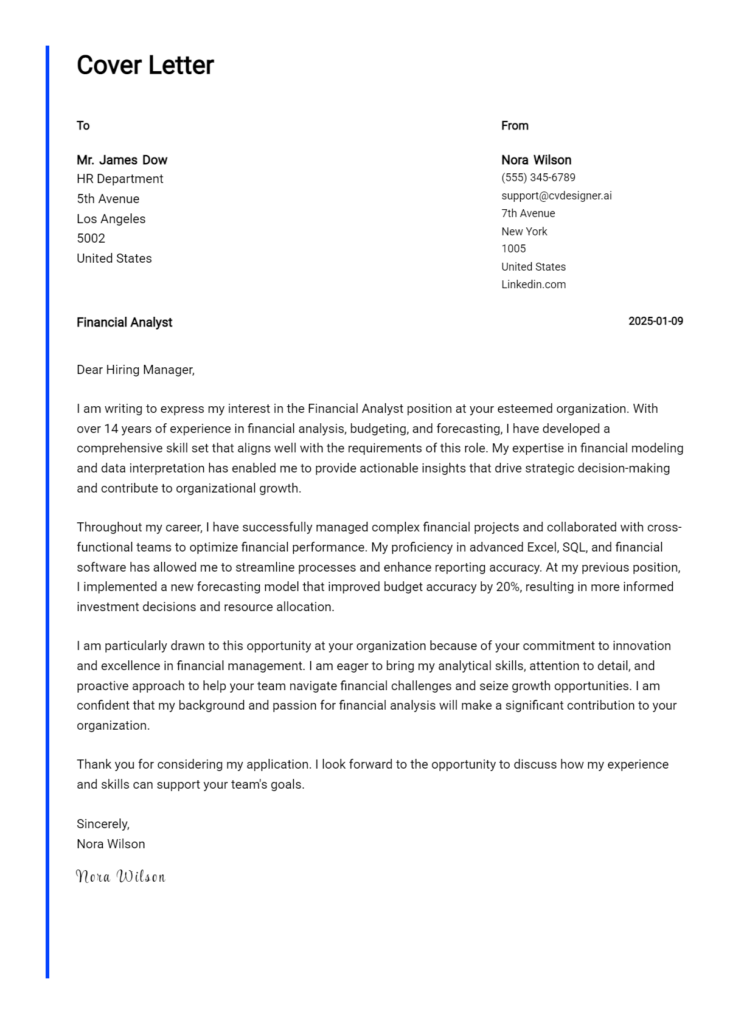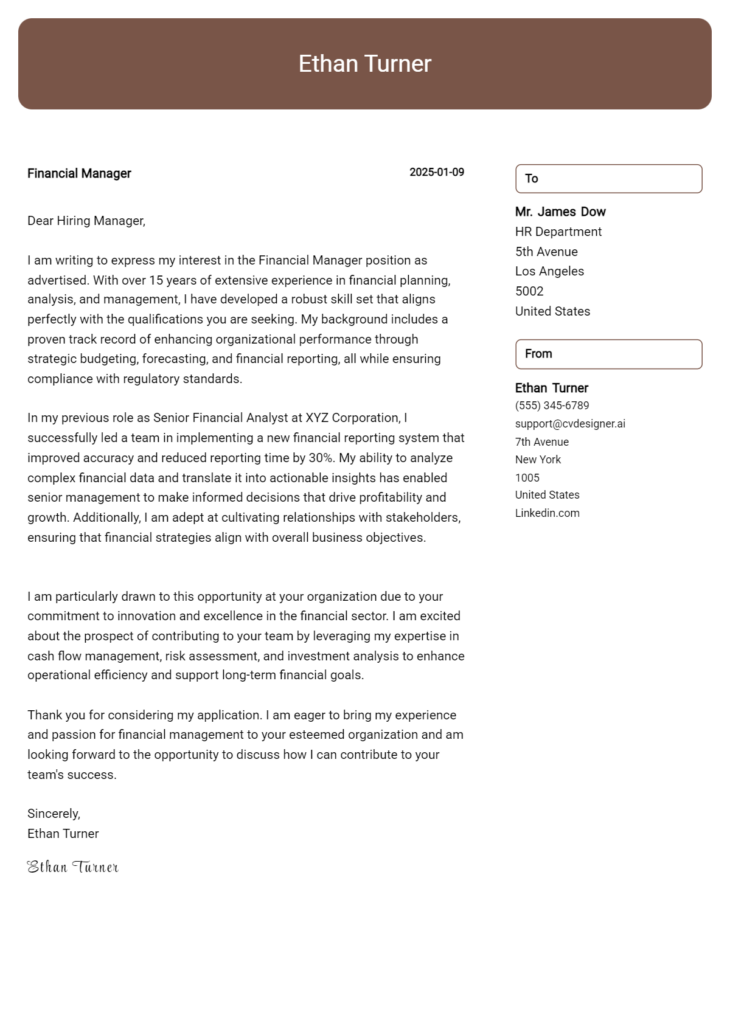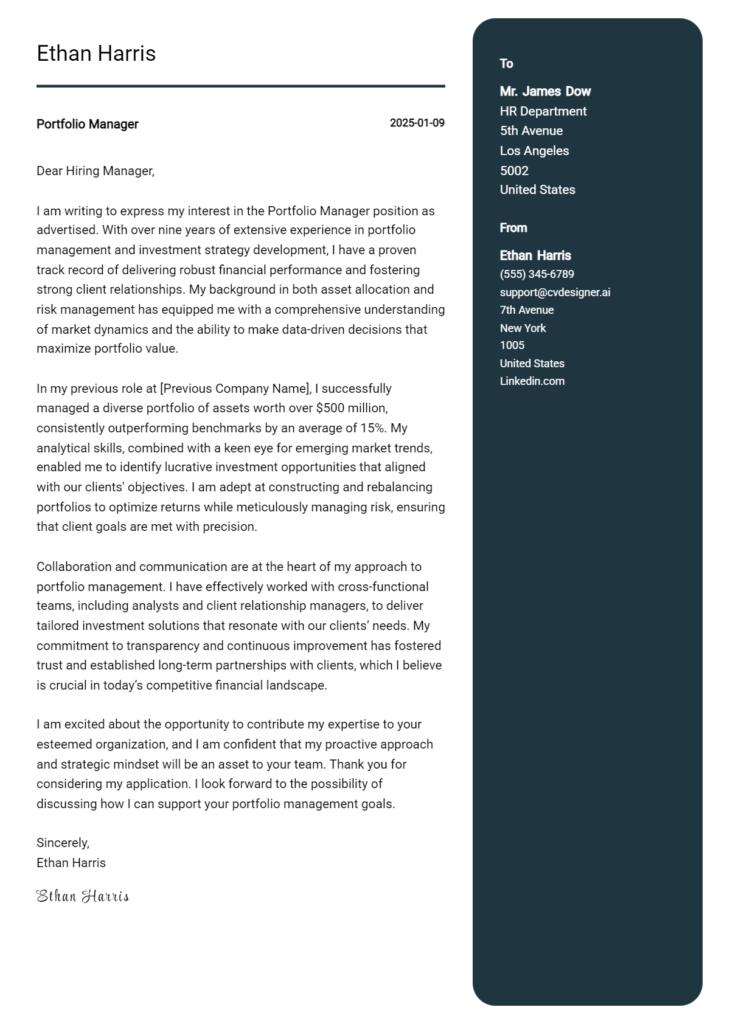Credit Analyst Cover Letter Examples
Explore additional Credit Analyst cover letter samples and guides and see what works for your level of experience or role.
How to Format a Credit Analyst Cover Letter?
Crafting a well-structured cover letter is essential for a Credit Analyst, as it not only conveys your qualifications but also reflects your analytical acumen and attention to detail. In the finance sector, where precision is paramount, the way you present your skills can significantly influence a hiring manager's perception. A well-formatted cover letter captures attention and demonstrates your ability to communicate effectively—an essential trait for anyone in credit analysis.
In this guide, we will explore how to structure your cover letter, providing valuable insights and examples tailored for credit analysts.
We’ll cover the essential components of a professional cover letter, including:
- Cover Letter Header
- Cover Letter Greeting
- Cover Letter Introduction
- Cover Letter Body
- Cover Letter Closing
Each section is crucial for showcasing your qualifications and professionalism. Let’s dive into the details of each part to help you craft a standout cover letter for your credit analyst application.
Importance of the Cover Letter Header for a Credit Analyst
The cover letter header is a critical component of any professional correspondence, including applications for the role of a Credit Analyst. It sets the tone for the entire document and provides essential information at a glance. A well-structured header should include the applicant's contact information, the date, and the recipient's details, ensuring clarity and professionalism. This not only makes it easier for the hiring manager to contact the applicant but also reflects the applicant's attention to detail—an essential quality for a Credit Analyst. Below are examples of a strong and weak cover letter header:
Strong Example
John Doe 123 Finance St. Moneytown, NY 12345 (555) 123-4567 johndoe@email.com October 1, 2023 Jane Smith Hiring Manager XYZ Financial Services 456 Investment Ave. Wealthville, NY 67890
Weak Example
johndoe@email.com 10/01/2023 To Whom It May Concern:
The Importance of the Cover Letter Greeting
The greeting of your cover letter serves as the first impression you make on a potential employer, setting the tone for the rest of your application. A well-crafted greeting not only demonstrates professionalism but also adds a personal touch by addressing the hiring manager directly. Personalization can help you stand out in a competitive job market, particularly for roles like a Credit Analyst, where attention to detail is crucial. To create a strong greeting, avoid generic phrases such as "To Whom It May Concern" and instead take the time to research the hiring manager's name. This effort shows initiative and genuine interest in the position.
Strong Greeting Example
Dear Ms. Johnson,
Weak Greeting Example
To Whom It May Concern,
Cover Letter Introduction for Credit Analyst
A well-crafted cover letter introduction is crucial for a Credit Analyst position, as it serves as the first impression for the hiring manager. This introductory paragraph should not only capture attention but also convey genuine interest in the role and briefly highlight relevant skills or achievements. A strong introduction can set the tone for the entire letter, demonstrating the candidate's qualifications and enthusiasm, while a weak one may fail to engage the reader, risking the opportunity to make a lasting impact. Below are examples of strong and weak cover letter introductions for a Credit Analyst role.
Strong Example
Dear [Hiring Manager's Name], I am excited to apply for the Credit Analyst position at [Company Name] as advertised on [Job Board/Company Website]. With over five years of experience in credit analysis, coupled with a proven track record of improving loan approval processes by 30%, I am eager to bring my analytical skills and attention to detail to your esteemed team. My passion for data-driven decision-making and commitment to fostering financial responsibility make me a perfect fit for this role, and I am enthusiastic about the opportunity to contribute to [Company Name]'s continued success.
Weak Example
To Whom It May Concern, I am writing to apply for the Credit Analyst position. I think I could do well in this job because I have some experience in finance. I believe I can help your company with credit decisions. Thank you for considering my application.
Purpose of the Cover Letter Body for a Credit Analyst
The cover letter body for a Credit Analyst serves as a crucial opportunity for candidates to articulate their qualifications and demonstrate their potential value to the company. This section should highlight relevant skills, experiences, and accomplishments that align with the job requirements, such as proficiency in financial analysis, risk assessment, and credit evaluation. By detailing specific projects—like successfully managing a portfolio that improved default rates or implementing a new credit assessment tool—the candidate can effectively convey their ability to contribute to the company's success. A well-crafted cover letter body not only showcases the candidate’s technical skills but also illustrates their problem-solving abilities and commitment to delivering results.
Strong Example
Dear Hiring Manager, I am excited to apply for the Credit Analyst position at XYZ Company. In my previous role at ABC Financial Services, I successfully managed a portfolio of over 200 clients, where I implemented a new risk assessment model that reduced default rates by 15%. Additionally, I collaborated with the underwriting team to streamline the credit evaluation process, resulting in a 20% reduction in processing time. My ability to analyze financial statements and assess creditworthiness, combined with my passion for helping clients achieve their financial goals, makes me a strong candidate for this position. I am eager to bring my expertise to XYZ Company and contribute to its mission of providing innovative financial solutions.
Weak Example
Dear Hiring Manager, I would like to apply for the Credit Analyst position. I have worked in finance for a few years and feel that I would be a good fit. I have done some analysis and have experience with clients. I think I can help your company. I have not worked on any major projects, but I am willing to learn. Thank you for considering my application.
Importance of the Cover Letter Closing for a Credit Analyst
The closing paragraph of a cover letter is crucial for a Credit Analyst as it serves to summarize the candidate's qualifications, reaffirm their enthusiasm for the position, and prompt further action, such as reviewing the resume or scheduling an interview. A strong closing leaves a lasting impression and reinforces the candidate's fit for the role, while a weak closing may fail to effectively communicate the candidate's eagerness or qualifications.
Strong Example
Thank you for considering my application for the Credit Analyst position at [Company Name]. With a solid background in financial analysis and risk assessment, coupled with my passion for data-driven decision-making, I am excited about the opportunity to contribute to your team. I am looking forward to discussing how my skills and experiences align with the goals of [Company Name]. Please feel free to review my attached resume and let me know a convenient time for us to connect for an interview.
Weak Example
I hope you look at my resume and think about my application. I want this job because it seems interesting. If you want to talk, you can call me or something.
These tips will assist candidates in crafting an effective cover letter for a Credit Analyst position. A well-written cover letter is crucial for standing out in a competitive job market. It should highlight your technical skills, problem-solving abilities, knowledge of the Software Development Life Cycle (SDLC), teamwork experience, and a passion for continuous learning—attributes that are essential for success in this role.
Cover Letter Writing Tips for Credit Analyst
Showcase Technical Skills: Clearly outline your proficiency in financial modeling, data analysis, and credit risk assessment tools. Mention specific software you are adept at, such as Excel, SQL, or specialized credit analysis software. Providing examples of how you've applied these skills in previous roles can help substantiate your expertise.
Emphasize Problem-Solving Abilities: Credit Analysts often face complex financial scenarios that require innovative solutions. Use your cover letter to highlight instances where you successfully identified issues, analyzed data, and implemented effective solutions. This demonstrates your analytical mindset and ability to navigate challenges.
Demonstrate SDLC Knowledge: If you have experience in projects that involve software development or implementation, mention your understanding of the Software Development Life Cycle. Explain how you have participated in or contributed to projects that align with the requirements of a Credit Analyst, showcasing your ability to integrate technology with financial analysis.
Highlight Teamwork Experience: Collaboration is vital in the role of a Credit Analyst, whether working with cross-functional teams or presenting findings to stakeholders. Include examples of successful team projects where your contributions made a significant impact. This will underline your ability to work well with others and communicate effectively.
Express a Passion for Continuous Learning: The financial industry is constantly evolving, and showing that you are committed to professional growth can set you apart. Mention any certifications, courses, or workshops you have pursued related to credit analysis or finance. Additionally, share your enthusiasm for staying updated with industry trends and regulations, illustrating your proactive approach to learning.
Common Mistakes to Avoid in a Credit Analyst Cover Letter
Crafting a compelling cover letter is essential for standing out in the competitive field of credit analysis. Avoiding common mistakes can significantly enhance your chances of making a positive impression. Here are some frequent pitfalls to watch out for:
Generic Greeting: Using "To Whom It May Concern" can make your application seem impersonal. Instead, find out the hiring manager's name and address them directly.
Lack of Specificity: Failing to tailor your cover letter to the job description can lead to a missed connection. Highlight relevant skills and experiences that align with the specific requirements of the credit analyst position.
Too Much Focus on Responsibilities: Simply listing past job duties can be unengaging. Instead, emphasize your achievements and how they benefited previous employers.
Neglecting Financial Terminology: Avoiding industry-specific language can suggest a lack of knowledge. Use appropriate financial terminology to showcase your expertise.
Overly Long or Short Letters: A cover letter that is too brief may seem rushed, while an overly lengthy one can lose the reader's interest. Aim for a concise, engaging letter that is no longer than one page.
Spelling and Grammar Errors: Typos can undermine your professionalism. Always proofread your letter or have someone else review it before submission.
Ignoring the Closing: A weak conclusion can leave a lasting negative impression. Ensure you include a strong closing statement that expresses enthusiasm for the role and invites further discussion.
By steering clear of these mistakes, you can create a more effective cover letter that captures the attention of hiring managers in the credit analysis field.
Cover Letter FAQs for Credit Analyst
What should I include in my cover letter for a Credit Analyst position?
In your cover letter for a Credit Analyst position, you should include a brief introduction that states the position you’re applying for and how you found out about it. Highlight your relevant experience, such as your background in finance, analytical skills, and familiarity with credit analysis tools. Mention specific achievements, such as successful credit assessments or risk management strategies you have implemented. It's also beneficial to express your understanding of the company’s goals and how your skills align with them. Conclude with a strong closing statement that invites further discussion during an interview.
How can I demonstrate my analytical skills in my cover letter?
To effectively demonstrate your analytical skills in your cover letter, provide concrete examples of how you have applied these skills in previous roles. Use metrics and data to showcase your achievements, such as how you improved credit assessments or reduced default rates. Discuss specific tools or methodologies you are proficient in, such as financial modeling or risk assessment frameworks. Additionally, you can mention any relevant certifications or coursework that highlight your analytical capabilities. This not only shows your skills but also your commitment to the profession.
Should I tailor my cover letter for each job application?
Yes, it’s essential to tailor your cover letter for each job application, especially for a specialized role like a Credit Analyst. Customizing your cover letter allows you to align your skills and experiences with the specific requirements of the job description. Research the company’s values, mission, and recent projects to demonstrate your genuine interest. Highlight relevant experiences that match the job’s responsibilities and use specific terminology from the job posting. This personalized approach can significantly enhance your chances of making a strong impression on hiring managers.
How long should my cover letter be for a Credit Analyst position?
Your cover letter for a Credit Analyst position should ideally be one page long, consisting of three to four paragraphs. Aim for a length of about 250 to 400 words. This length allows you to convey your qualifications without overwhelming the reader. Start with a strong opening paragraph, follow with a detailed body that highlights your relevant skills and experiences, and end with a concise conclusion that reiterates your interest and prompts further discussion. Keeping it concise and focused will ensure that your key points are effectively communicated.
Build your Cover Letter in minutes
Use an AI-powered cover letter builder and have your letter done in 5 minutes. Just select your template and our software will guide you through the process.

